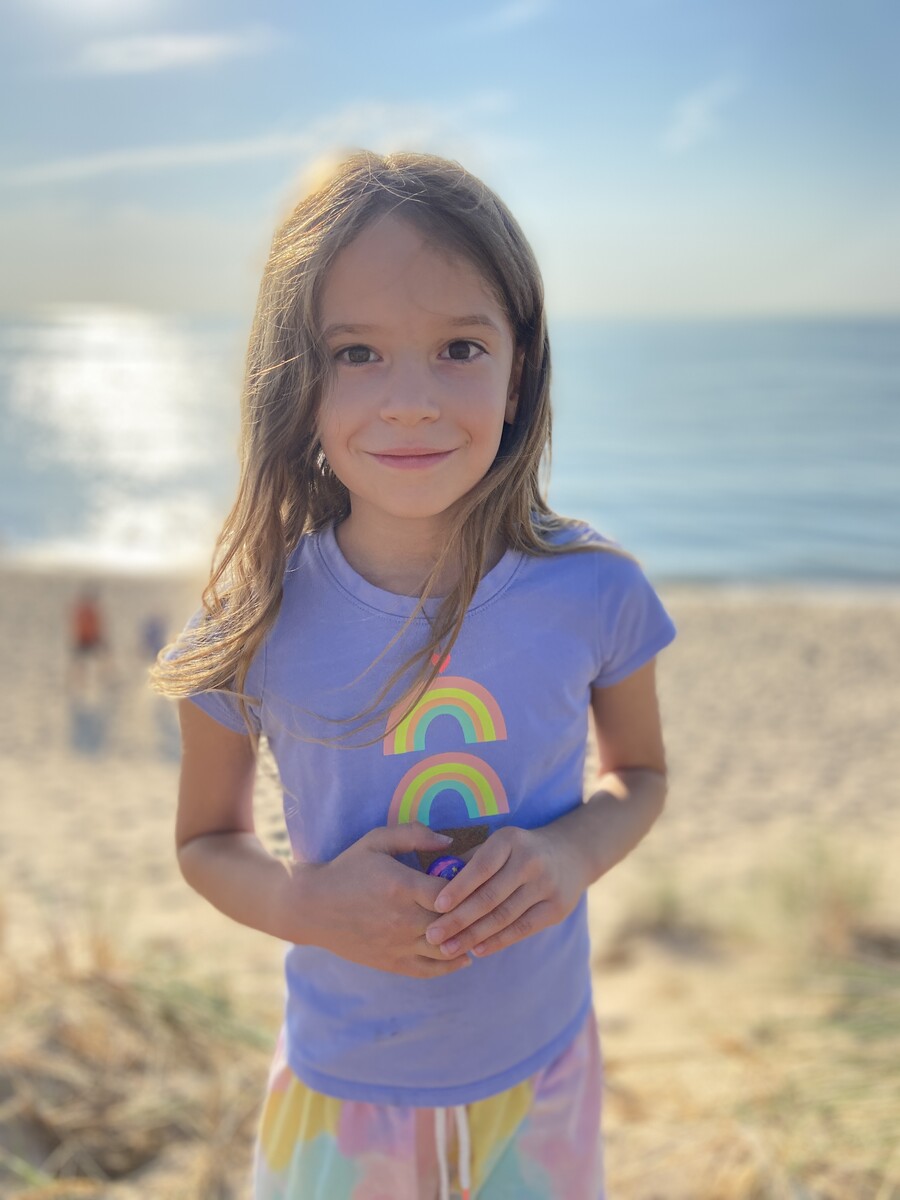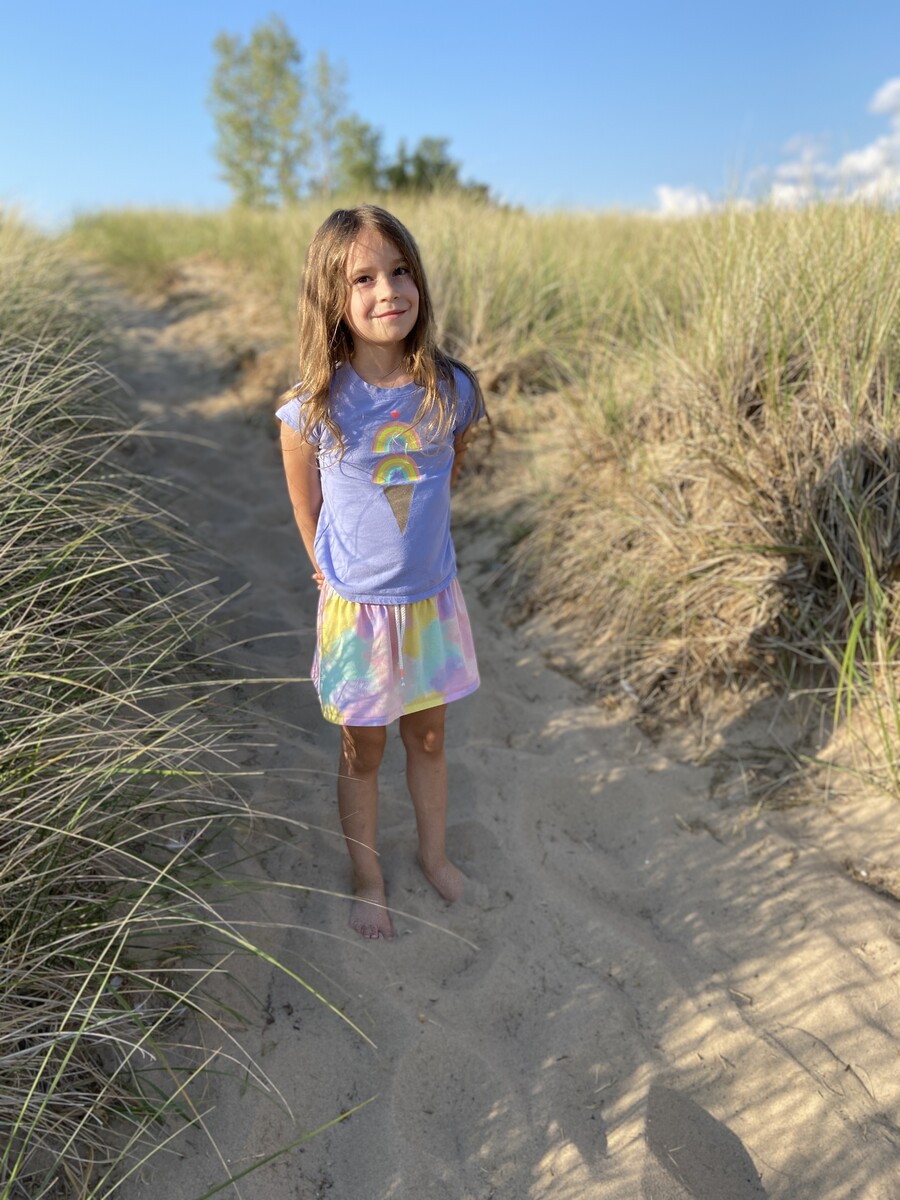

Yesterday, we took a quick bike trip across town to one of the Little Free Libraries — Ess on a tag-along bike, only one wheel to it and a rigid attachment to my seat post. The season of drought has partially lifted and the green leaves in the gentle late summer sun and the blue sky… I don’t think there’s room to improve on the lovely weather we had. We looked for bunnies and sang out when we saw them, Ess got harassed by a barking dog at a stoplight, we huffed and puffed up hills… the usual bike stuff.
So Ess made her selection and we pedaled for home, I thought — when I turned around, she had eschewed pedaling entirely, pulled her new book out from her bike pouch, and was just reading, with the book resting on her handlebars.
There’s a lot to say about our trip to Omaha. The short version is: we hadn’t traveled in a while so we thought we’d give a short road trip a try to figure out how it would all work. The slightly longer version is: we never had so many unwelcome surprises in one trip, from having to bail on a hotel because it was so unclean, to me coming back to the car to find Ess and Mykala crying because nothing was going right, to the entire city of Omaha being rather a bit different than how it looked in the online research, to moving to a different hotel each day. In the end, it all held together, and we had what mattered most: a nice time together. They say traumatic experiences build teams, and so I think the same is true of times like this… bad vacations make families stronger.
Ess will always remember the hotel with dog pee in the corner, the one we ran away from as fast as we could.
I was fixing a sprinkler last weekend and Ess jumped in to help: running all over the yard with me as we watched the water flow so I could flush just the right amount of water through the new connection.
This made things in the hole a bit muddy, but Ess was still excited to help me put the earth back in the hole — we got her set up with Mykala’s gardening gloves to do it. And as we were walking to the backyard, she exclaimed: “Oh good! Now that we’re both wearing gloves, I can hold your hand!”
And she did.
I honestly don’t recall if I have written about it here, but a few years back I realized that I have always agreed with every bit of feminism I have encountered, including radical feminism. So, I have reordered my book-reading to match. Until I feel confident that I can understand history and the present-day through the lens of feminism, every book I read will be a feminist book. So far, I’ve read:
Not That Bad: Dispatches from Rape Culture by Roxane Gay
Female Chauvinist Pigs: Woman and the Rise of Raunch Culture by Ariel Levy
Men Explain Things to Me by Rebecca Solnit
Untamed by Glennon Doyle
Nimona by Noelle Stevenson
The Purity Myth: How America’s Obsession with Virginity is Hurting Young Women by Jessica Valenti
Shrill by Lindy West
Professions for Women by Virginia Woolf
And around the internet:
Letter the Stanford Victim Read Aloud To Her Attacker
Men Still Explain Things to Me
If Hermione Were The Main Character In Harry Potter
Jessica Valenti: my life as a ‘sex object’
This is all based on a list from Lauren Parker called Feminist Primer, which used to be on her website. It is currently on Medium: The List of Books Men Must Read Before Messaging Me. I’ve made some of my own additions, so I have over forty books to go. I need to read faster.
So anyway, I’m currently reading The Feminine Mystique by Betty Friedan, and this idea popped into my head while reading:
In chapter one, Friedan is describing her 1940s perspective of a very real concern about regression to the 1800s, an almost atavistic return to earlier gender rolls where women lose: autonomy, dignity, education, personhood. This is frequently exemplified by the generation after Friedan choosing to sacrifice education, career, and fulfillment on the altar of premature marriage and stultifying domesticity. As a nation, we have a deeply entrenched default of that particular restricted and personhood-denying vision of femininity however this default is hidden under the effects of generations of economic contraction since Friedan wrote in the 40s. What I mean is this: women are marrying older, having fewer children later, forging careers — is this because we listened to Friedan? No. We, as a nation most certainly did not enthusiastically embrace, support, or push for feminist equality, laws, and reordering of the social fabric. The patriarchy of the United States still polices every facet of womanhood and denies her humanity. However, the economic reality of being a woman, where a vibrant life outside of constant work (much less heading a single-earner household) are near-impossibilities, where kids produce real economic hardship, these realities have produced different behaviors in the past few generations, and these changes in behavior, while appearing to show progress towards feminism on the surface, in fact cover up the nation’s unresolved and deeply entrenched anti-feminism.
So that’s just a bland stream-of-consciousness from me during reading. BUT. But but but: when I record the refinement of my understanding of feminism here, please know that it is not a contribution to the great discussion taking place across the decades. It is merely a bookmark in the reading list of my own growth. Don’t read what I’m saying, read what the women who live this shit daily are saying. Listen to them. Believe them.
Annie Dillard:
How we spend our days is, of course, how we spend our lives. What we do with this hour, and that one, is what we are doing. A schedule defends from chaos and whim. It is a net for catching days. It is a scaffolding on which a worker can stand and labor with both hands at sections of time. A schedule is a mock-up of reason and order—willed, faked, and so brought into being; it is a peace and a haven set into the wreck of time; it is a lifeboat on which you find yourself, decades later, still living.
↓ More